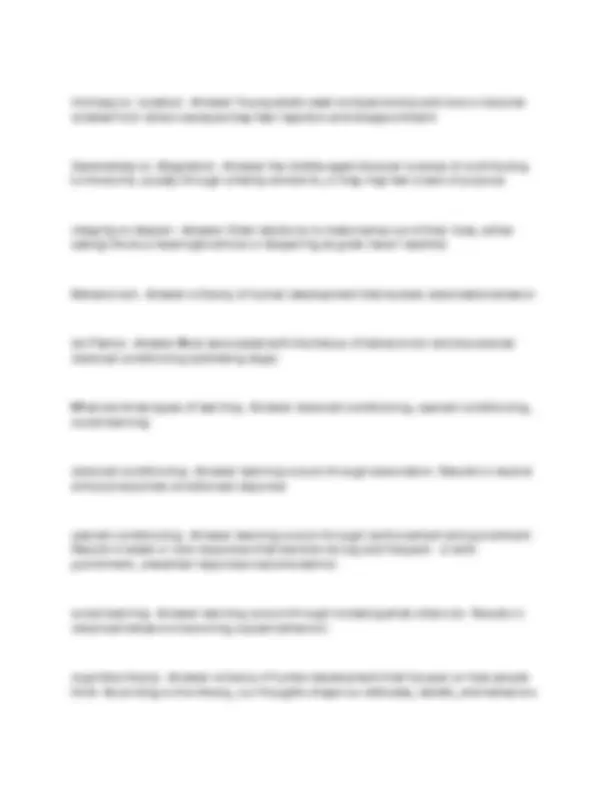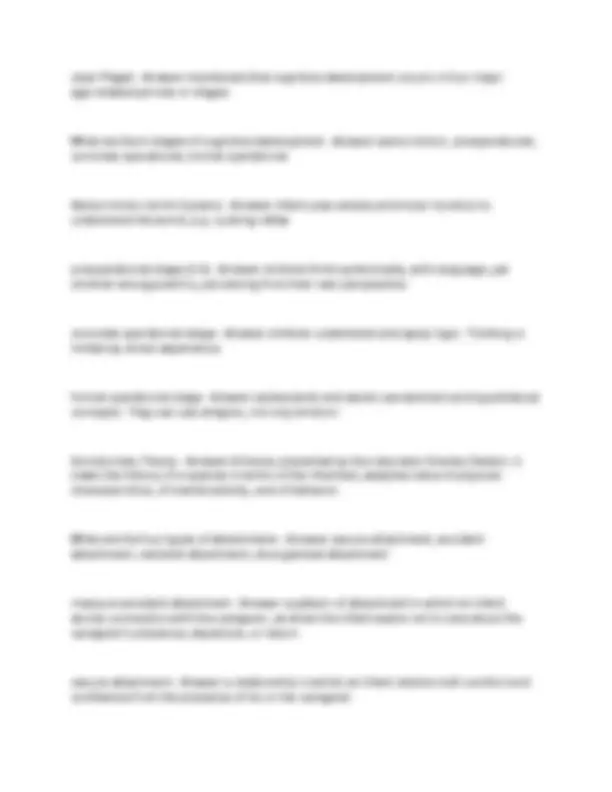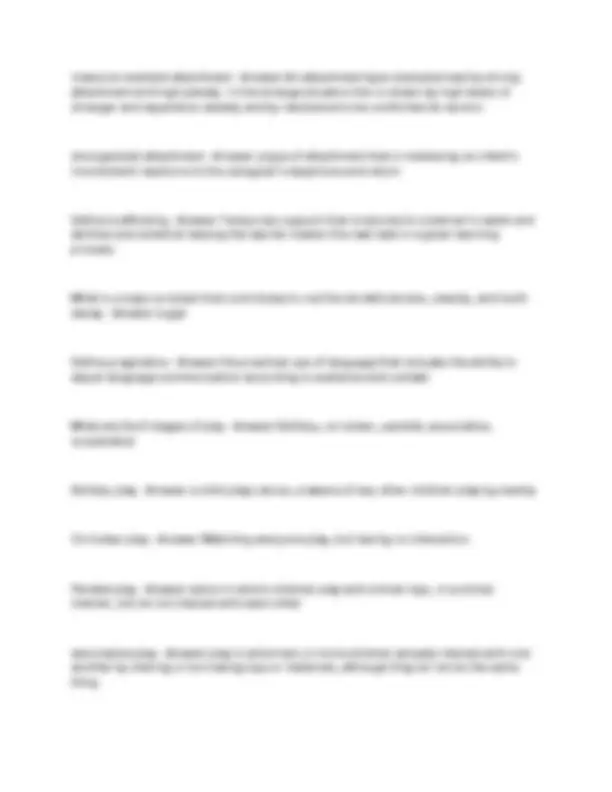





Study with the several resources on Docsity

Earn points by helping other students or get them with a premium plan


Prepare for your exams
Study with the several resources on Docsity

Earn points to download
Earn points by helping other students or get them with a premium plan
Community
Ask the community for help and clear up your study doubts
Discover the best universities in your country according to Docsity users
Free resources
Download our free guides on studying techniques, anxiety management strategies, and thesis advice from Docsity tutors
A comprehensive review of key concepts and theories in human development, covering topics such as psychoanalytic theory, psychosocial stages, behaviorism, cognitive development, attachment theory, and parenting styles. It includes definitions, explanations, and examples to aid in understanding and preparing for a final exam in an edu120 course.
Typology: Exams
1 / 7

This page cannot be seen from the preview
Don't miss anything!




psychoanalytic theory - Answer A theory developed by Freud that attempts to explain personality, motivation, and mental disorders by focusing on unconscious determinants of behavior
Who was Freud? - Answer -first psychoanalyst
-proposed 5 psychosexual stages during which sensual satisfaction is linked to developmental needs and conflicts
-suggests early conflict resolution determines personality pattern
What are Freud's psychosexual stages? - Answer oral stage, anal stage, phallic stage, latency stage, genital stage
Oral Stage (birth-1 year) - Answer the lips, the tongue, and the gums are the focus of pleasurable sensations in the baby's body, and sucking and feeding are the most stimulating activities.
Anal Stage (1-3 years) - Answer The anus is the focus of pleasurable sensations in the baby's body, and toilet training is the most important activity
Phallic Stage (3-6 years) - Answer Freud's third stage of development, when the penis becomes the focus of concern and pleasure and girls wonder why they don't have them
Latency Stage (6-puberty) - Answer stage focuses on dormant sexual feelings
Genital Stage (puberty on) - Answer sexual feelings re-emerge and are oriented toward others
Erik Erikson (1902-1994) - Answer Described eight developmental stages, each characterized by a challenging developmental crisis
Proposed five psychosocial stages build on Freud's theory, but added three adult stages
What are the 8 psychosocial stages? - Answer trust vs mistrust
autonomy vs shame and doubt
initiative vs guilt
industry vs inferiority
identity vs role confusion
intimacy vs isolation
generativity vs stagnation
integrity vs despair
Trust vs. Mistrust (birth-1 year) - Answer Infants learn that they can or cannot trust others to take care of their basic needs
Autonomy vs. Shame and Doubt (1-3) - Answer Children either become self-sufficient in many activities, including toileting, feeding, walking, exploring, and talking, or doubt their own abilities.
Initiative vs. Guilt (3-6) - Answer children learn to initiate tasks and carry out plans, or they feel guilty about their efforts to be independent
Industry vs. Inferiority (6-11) - Answer Children busily practice and then master new skills or feel inferior, unable to do anything well.
identity vs. role confusion (12-18) - Answer adolescents ask themselves "Who am I?" They establish sexual, political, religious, and vocational identities or are confused about their roles
Jean Piaget - Answer maintained that cognitive development occurs in four major age-related periods or stages.
What are the 4 stages of cognitive development - Answer sensorimotor, preoperational, concrete operational, formal operational
Sensorimotor (birth-2 years) - Answer Infant uses senses and motor function to understand the world, e.g. sucking reflex
preoperational stage (2-6) - Answer children think symbolically, with language, yet children are egocentric, perceiving from their own perspective.
concrete operational stage - Answer children understand and apply logic. Thinking is limited by direct experience.
formal operational stage - Answer adolescents and adults use abstract and hypothetical concepts. They can use analysis, not only emotion.
Evolutionary Theory - Answer A theory presented by the naturalist Charles Darwin; it views the history of a species in terms of the inherited, adaptive value of physical characteristics, of mental activity, and of behavior.
What are the four types of attachments - Answer secure attachment, avoidant attachment, resistant attachment, disorganized attachment
insecure-avoidant attachment - Answer a pattern of attachment in which an infant avoids connection with the caregiver, as when the infant seems not to care about the caregiver's presence, departure, or return
secure attachment - Answer a relationship in which an infant obtains both comfort and confidence from the presence of his or her caregiver
insecure-resistant attachment - Answer An attachment type characterised by strong attachment and high anxiety. In the strange situation this is shown by high levels of stranger and separation anxiety and by resistance to be comforted at reunion.
disorganized attachment - Answer a type of attachment that is marked by an infant's inconsistent reactions to the caregiver's departure and return
Define scaffolding - Answer Temporary support that is tailored to a learner's needs and abilities and aimed at helping the learner master the next task in a given learning process
What is a major problem that contributes to nutritional deficiencies, obesity, and tooth decay - Answer sugar
Define pragmatics - Answer the practical use of language that includes the ability to adjust language communication according to audience and context
What are the 5 stages of play - Answer Solitary, on-looker, parallel, associative, cooperative
Solitary play - Answer a child plays alone, unaware of any other children playing nearby
On-looker play - Answer Watching everyone play, but having no interaction.
Parallel play - Answer action in which children play with similar toys, in a similar manner, but do not interact with each other
associative play - Answer play in which two or more children actually interact with one another by sharing or borrowing toys or materials, although they do not do the same thing
Puberty - Answer the period when children's bodies become adult in terms of size, shape, and sexuality
Egocentrism - Answer thinking intensely about one selves and what others think about them
What is the main goal of adolescence - Answer to find one's own identity
Expert - Answer a person with special knowledge or ability who performs skillfully